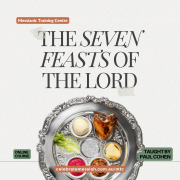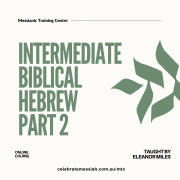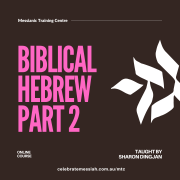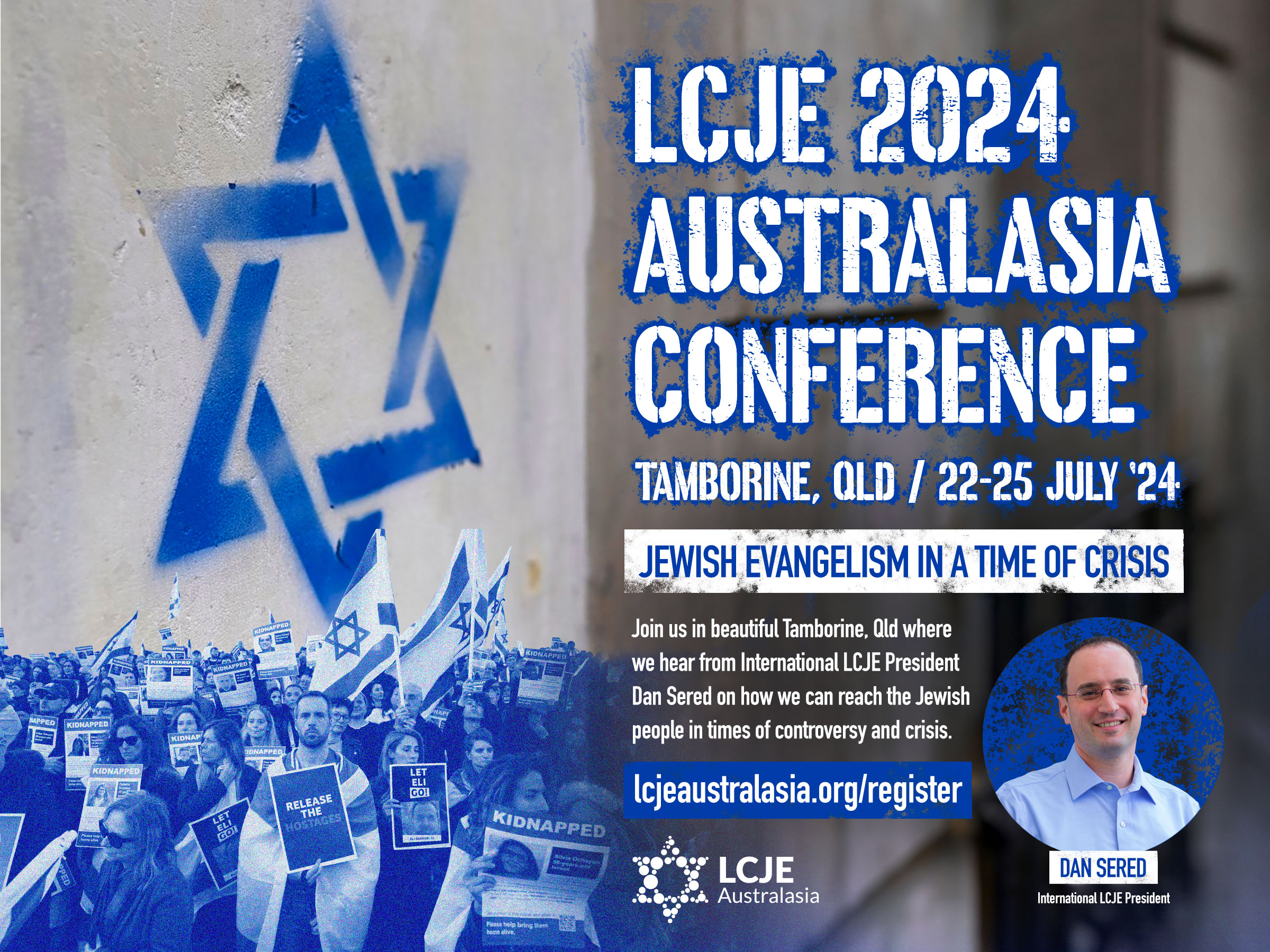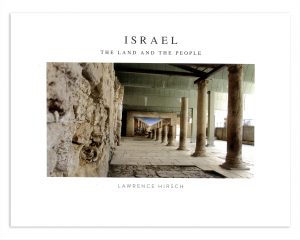Read Only Version
Letter from Our Executive Director
Dear friend in the Messiah,
Shalom, and happy Passover.
Since the exodus, Jewish people around the world have celebrated Passover as a memorial to God’s love, power, and plan for Jewish people. It is a reminder of how the Lord of the universe, against all odds, promised to deliver the Israelites from Egyptian bondage and bring them back to the land of Israel (Genesis 15:13–14). Passover reminds us God has not forgotten His promises to His people.
If God keeps His promises to Jewish people, then we have further confidence He will keep His promises to all those who have trusted in Yeshua!
Each year, on the fourteenth day of Nisan on the Hebrew calendar, God asks the people of Israel to stop whatever they are doing and observe the Passover—regardless of circumstances. The Jewish community observed the festival amid the darkest moments of Jewish history—the Crusades, pogroms in Eastern Europe, the Holocaust, and the wars following the formation of the modern State of Israel in 1948.
Despite the terrible loss of life on October 7, 2023, and the ongoing war we currently face in Israel, Jewish people will again remember God’s miraculous redemption and faithfulness as revealed through the Passover! The observance of Passover is a higher priority than all other events or challenges we face as families and as Jewish people. Our busy schedules must bow to the Lord’s commands and plans—this is true not only for Jewish people but for every follower of Yeshua as well!
Passover: Hope for Shattered Trust
On October 7, most Israelis lost trust in the army and government, whose preparation for and response to the flagrant violation of Israel’s borders was insufficient at best. I cannot blame my fellow Jewish people living in Israel for feeling this way, as they were profoundly disappointed by those entrusted to protect them. When we draw back the curtains of history and look at the story of Passover, we see there is only One who merits our complete trust—God Himself.
Our prayer at this time for our Jewish people is that we will look to the Lord for our salvation as King David proclaimed; “Some trust in chariots and some in horses, but we trust in the name of the Lord our God.” (Psalm 20:7, ESV)
God is faithful to keep his promises to His ancient covenant people, and He is faithful to keep his promises to each one of us who trust in Yeshua our Messiah, the Lamb of God who takes away the sin of the world.
We hope that you enjoy this special edition newsletter as we explore the History of Christian Zionism. We are so grateful to the many Christians who love and support Israel and the Jewish people, especially in dire times like these. Thank you for praying for Israel and standing with our Jewish people here in Australia, and partnering with us for the salvation of Israel.
Thank you for your support of Celebrate Messiah in “bringing the Message to the Original Messengers.” Please also remember our appeal for support in providing travelling Israelis a refuge and shelter through our ZulaRoo project so we can fulfill God’s command to “Comfort, comfort my people…” (Isa 40:1).
Happy Passover from your Celebrate Messiah family,
Lawrence Hirsch
Executive Director, Celebrate Messiah Australia
A History of Christian Zionism
By Reverend Thomas Fretwell
With the terrorist attacks against the State of Israel on October 7, 2023, and the subsequent shocking manifestation of global antisemitism, it is now more important than ever for the church to have an accurate understanding of God’s plan for Israel.
Although the topic of Israel is a major theme found throughout the Scriptures, it also generates a lot of confusion in the church today. The church has historically fluctuated between two positions when it comes to formulating a theology of Israel and the church. The first is supersessionism, which broadly believes the coming of Jesus spiritually fulfilled the covenantal promises to Israel through the church. This perspective not only removes any distinctive role for Israel as a national entity but also universalizes the specific land promises. As a result, according to proponents of supersessionism, the New Testament redefines the land promises as the whole world. In short, there is neither a specific role for Israel nor any particular land promises for the Jewish nation.
Historically, this viewpoint has resulted in varying levels of anti-Jewish behavior and belief. While supersessionism does not necessarily lead to antisemitism, an analysis of historical antisemitism leads one to agree with theology professor Michael J. Vlach: “It is undeniable that anti-Jewish bias has often gone hand in hand with the supersessionist view.”1
The other main perspective, Christian Zionism, opposes supersessionism. David Schmidt, a scholar of Middle East history, aptly summarizes its basic tenets:
The return of the Jews to the Holy Land and the restoration of a physical Israel is in accordance with biblical prophecy. Furthermore, Christian Zionism is motivated by a biblically based religious conviction that the Jewish people are still God’s Chosen people and are entitled to possess the land of Israel for all time.2
Christian Zionism was confirmed for many Christians in 1948 when the modern State of Israel was reborn in her ancient homeland. However, it would be a mistake to conclude, as many critics do, Israel’s rebirth was the cause of this belief, or Christian Zionism is simply a contemporary political ideology.
There have been Christians waiting for the return of Jewish people to the land of Israel long before 1948, and even before the secular Zionist movement of Theodor Herzl in the late nineteenth century. Herzlian Zionism, as represented in his book The Jewish State (1896), argues for a Jewish return to Zion as the only means to escape antisemitism. Christian Zionism, while similar to its secular counterpart in several ways, is primarily a biblical and theological conviction based upon a particular reading of the Scriptures. Although the term “Christian Zionist” first appeared in the late nineteenth century, those who affirmed a Jewish return to the land and a future role for Israel were referred to as “restorationists” before this time. According to Eugene H. Merrill, an Old Testament scholar, this group “pre-dated modern political Zionism, and when political Zionism arose within the Jewish community in the late nineteenth century, many Christian restorationists gave it their enthusiastic support.”3
Much of the discussion surrounding Zionism today is concerned with the political and legal questions dominating the conversation in the public sphere. However, those who affirm a biblical role for Jewish people base their arguments first upon the Bible, and then usually move to offering valid justifications for Israel’s self-determination today.
The Biblical Roots of Christian Zionism
The beliefs of Christian Zionism are primarily rooted in the covenants and promises God made to Israel. These include the election of Israel as a nation (Deuteronomy 7:6; Psalm 135:4), and the promise of a land for the descendants of Abraham, Isaac, and Jacob (Psalm 105:9–11).
God also promised Israel global blessing through Abraham’s seed (Genesis 12:3), and a future national redemption at the end of the age (Zechariah 12:10). Christian Zionists acknowledge the Bible speaks both of the nation going through times of dispersion from the land and the promise to be regathered back into the land (Ezekiel 36:24–26).
Not believing in the Messiah does not disqualify ethnic Israel from these covenantal promises, as the apostle Paul states, “The gifts and the calling of God are irrevocable” (Romans 11:29). God is faithful to keep His promises to both individuals and nations. The nation in unbelief is still beloved for the sake of the fathers (Rom 11:28). Gentiles who partake of the spiritual blessings of these covenants should earnestly desire and pray for the salvation of Israel (Rom 10:1, 15:27).
These promises find their origin in the covenant with Abraham in Genesis 12:1–3, 15:18, and 17:1–5. The promises include both personal ones to Abraham and national ones to his descendants—who would become a great nation and receive the land of Canaan as an everlasting inheritance. The Abrahamic Covenant has been described as the “central theological rubric of the Old Testament”4 because it contains the roots of redemption to come through a land, a nation, and ultimately universal blessing through a person descended from this nation—the Messiah Jesus. These promises are confirmed and amplified by the Davidic Covenant (2 Samuel 7:12–16) and the New Covenant (Jeremiah 31:27–33), as well as numerous statements found in the prophets. The New Testament never rescinds these promises and, contrary to supersessionist claims, neither does it reinterpret them.
Contemporary Christian Zionism
In Britain, Christian Zionism reached its peak in the late nineteenth and early twentieth century. Several factors coincided, leading to Christian Zionists having significant cultural and political influence during this century. These included the rise of Victorian evangelicalism and social activism and the beginnings of Herzl’s political Zionist movement. Many of these Christian Zionists in Britain at this time held title and influence among the political elite of their day. Ultimately, this support would lead to a decisive policy change by the British government in the Balfour Declaration (1917), which committed to providing a national home for Jewish people in Israel.
In the twentieth century, the mantle of Christian Zionism shifted to the United States. Many historians attribute this to the rise of dispensationalism, a view of biblical theology emphasizing the distinction between Israel and the church, and its influence in parts of North America through seminaries and Bible conferences. As dispensationalism spread quickly in the early twentieth century, it served as a unifying force for American evangelicalism. Dispensationalists had a keen interest in eschatological events and a firm belief in the continued election and importance of Israel.
In addition, Christian Zionism has spread rapidly around the world, particularly in South America and South Korea, so much so it has become quite a global phenomenon. With this popularity, there has also arisen a strong stream of Christian anti-Zionist sentiment among those holding to a supersessionist theology. This perspective advocates strongly for the pro-Palestinian narrative and rejects any Christian support of Israel as complicit in alleged Israeli oppression. A recent letter from some Palestinian Christians expressed their “horror” at the “unwavering” support many churches have toward Israel.5
Biblical Christian Zionism should not advocate for anything violating the teaching of the New Testament, which means there is a requirement to show genuine love and concern for the spiritual and physical well-being of Palestinians and all inhabitants of the Middle East. At the same time, Christians should denounce horrific acts of terrorism for what they are—evil.
Believing in the faithfulness of God to keep His promises to Israel does not require supporting every Israeli policy or denigrating Palestinians. Christian Zionists fully affirm God loves Jewish people, Arabs, and all inhabitants of the Middle East, and He sent His beloved Son, Jesus the Messiah, to provide a way for all people to be reconciled to God and to each other. Therefore, Christian Zionists will continue to pray for the peace of Jerusalem and for the gospel to go forth in the Middle East.
Thomas Fretwell is currently undertaking PhD research in a field related to Jewish-Christian studies. He is the founder and ministry director of The Ezra Foundation, which exists to encourage and facilitate the serious study of the Word of God by producing resources promoting a biblical understanding of Israel in the plan of God. Thomas hosts the Theology & Apologetics podcast and serves as the senior pastor at Calvary Chapel Hastings.
1 Michael J. Vlach, Has the Church Replaced Israel?: A Theological Evaluation (Nashville: B&H Academic, 2010), 5.
2 David W. Schmidt, Partners Together in This Great Enterprise: The Role of Christian Zionism in the Foreign Policies of Britain and America in the 20th Century (Maitland, FL: Xulon Press, 2011), xx.
3 The Faith and Order Commission, God’s Unfailing Word: Theological and Practical Perspectives on Christian-Jewish Relations (London: Church House Publishing, 2019), 79.
4 Eugene H. Merrill, “Israel According to the Torah,” in The People, the Land, and the Future of Israel: Israel and the Jewish People in the Plan of God, ed. Darrell L. Bock and Mitch Glaser (Grand Rapids, MI: Kregel Publications, 2014), 34.
5 Heather Preston, “Palestinian Christians Urge Western Church to Repent of ‘Appalling’ Israeli Support,” Premier Christian News, October 25, 2023, sec. World News, https://premierchristian.news/en/news/article/palestinians-urge-western-christians-to-repent-of-appalling-israeli-support.
Empower Your Faith: Messianic Courses for Everyone at Any Time, from Anywhere
Are you seeking knowledge of the Holy One, seeking a deeper understanding of the Bible and its Jewish context? The Messianic Training Centre, a ministry of Celebrate Messiah, is aimed at equipping and empowering believers for Messianic Jewish ministry and evangelism.
Over the past few years, we have produced courses like: “Bringing the Message to the Original Messengers”, “Messiah in the Psalms,” “Understanding the Book of Revelation” and “Understanding the Book of Lamentations”. Students have indicated it was transformative for them as they participated in the courses and the Q&A with instructors.
Our courses are designed to deepen believers’ love for God’s Word and His people, covering biblical studies, Jewish history and culture, and biblical languages. Additionally, we offer training in effective Jewish outreach.
Collaborating with expert local teachers and partnering with ministries like Chosen People Ministries in the USA and Israel enriches our curriculum. These instructors are knowledgeable and passionate, among them our own Executive Director, Lawrence Hirsch, and outreach worker for Celebrate Messiah Paul Cohen. Their in-depth knowledge and ability to connect scripture to contemporary life ignite a fresh perspective for students.
For example, in the course “Messiah in the Psalms”, Paul delves into the prophesies within the psalms to reveal a new depth of understanding. Lawrence Hirsch encourages and renews our passion of sharing the Gospel with the Original Messengers, the Jewish people, in “Bringing the Message”. In each course, instructors foster a dynamic learning environment where questions are encouraged and alternative viewpoints explored.
All courses are conducted interactively via live Zoom sessions, supplemented with Q&A sessions and relevant assessments. With affordability in mind, most courses are priced at around $12 per session. Past offerings such as “Understanding the Book of Revelation”, “The Reliability of the Scriptures”, “Hebrew for Beginners”, and “Bringing the Message to the Original Messengers” are available for download, featuring play-on-demand sessions, tutorials, and course notes for a nominal fee.
One student wrote:
“The Messianic Training Centre isn’t just about gaining knowledge; it’s about fostering a supportive community of learners. Through engaging discussions and insightful instruction, I felt empowered to delve deeper into my faith journey.”
For Semester 2 of 2024, the Messianic Training Centre will present three live courses: “Beginners Biblical Hebrew Part 2,” “Intermediate Biblical Hebrew Part 2,” and “The Seven Feasts of the LORD: Historical Context and Prophetic Meaning.” If you are interested in joining the Part 2 Hebrew courses, you can enrol in Part 1 at any time to review previously covered material.
In our “The Seven Feasts of the LORD: Historical Context and Prophetic Meaning” course, students will learn more about these important festivals. The Seven Feasts of the LORD in Leviticus 23 mark a significant point in Israel’s history, establishing God’s covenant within an annual cycle of celebrations. By studying each feast, we note specific rituals and practices, some observed then and others still observed today. Knowing the historical context behind these practices deepens our understanding of their symbolic meaning and how they point to God’s program for Israel, the Body of Messiah and even to our own relationship with the LORD.
If you are looking to deepen your understanding of the Bible, we wholeheartedly endorse this course and all others we offer. They provide a fulfilling and life-changing experience for those on their spiritual journey. Want to know more? Explore our upcoming courses and registration information at celebratemessiah.com.au/mtc. Begin your quest for a deeper faith today! •
ZulaRoo Surf House: A Refuge for Israelis in Australia
In our previous issue, we introduced you to the ZulaRoo Surf House located in Apollo Bay, Victoria, a haven for Israeli travellers. “Zula,” an Israeli term for a cosy spot, perfectly encapsulates the atmosphere we’ve strived to create at our Surf House. This unique ministry provides a complimentary place to stay for Israelis journeying through Australia.
We officially inaugurated our Surf House on Australia Day, where believers from across Victoria gathered at ZulaRoo to pray for the property, the Bolton family who graciously host the Israeli guests, and for the welfare of all Israelis who will find refuge here. The warmth of Apollo Bay on that day mirrored our community’s deep devotion to God’s Chosen People.
Since December, our Surf House has seen a steady flow of more than 40 Israeli guests. Word-of-mouth referrals have brought many Israelis through our doors, even though we haven’t yet advertised the Surf House in Israel. Our guests have varied from solo travellers and newly-met groups of up to five, to long-time friends and honeymooning couples. Here are just a few of the messages taken from our guest book at Zularoo:
“Thank you for the warm experience, it was so homey and that’s an amazing feeling when we’re thousands of miles away from home in these crazy times.”
“From the first moment our paths crossed at the support rally, we felt such a strong connection to you and your presence there made us feel loved and protected.”
We are so honoured and blessed to be able to offer these young travellers a home-away-from-home, even if it is just for a short time. The Bolton family, our hospitable hosts, have had the privilege of sharing the message of Yeshua the Messiah with these backpackers. Together, they have also celebrated Shabbat and Jewish holidays like Hanukkah, fostering a sense of home and tradition away from home.
We now appeal to your generosity to help us finance and prepare this haven, this ZulaRoo, where Israelis can find a safe and welcoming refuge as they journey through our shores. God’s call to comfort His people resonates deeply with us here in Australia. We humbly seek your support on this journey of faith and obedience, inviting you to partner with us in Project ZulaRoo – a mission dedicated to comforting and caring for God’s people (Isaiah 40:1).
Our aim is to raise $1.4 million to secure this property entirely. You can go to celebratemessiah.com.au/zularoo to learn more about the Surf House, and celebratemessiah.com.au/donate to support us. •
News Briefs
Rallies Bring Hope
We want to share this anecdote from a Support Israel rally, which illustrates how the Lord is orchestrating connections during this crisis. It is a first-hand account from one of our outreach workers who participated in the rally:
“As the rally started we noticed a young Israeli couple standing on the periphery of the crowd. They seemed visibly upset and restless. I felt compelled to approach them and as I waited for the right moment, their emotions got the better of them and they both broke down crying.
I introduced myself in my basic Hebrew and asked if they were OK, when my husband then joined the conversation. They shared that they had just come from the Melbourne CBD where a large anti-Israel rally was happening. They said they felt an overwhelming fear for their lives as they passed by the event and a desperate need to hide. They couldn’t get out of there quick enough. Then they arrived at our rally that was showing love and support of Israel and the Jewish community; the contrast was like day and night, and they had a strong sense of safety and the freedom to express their emotions.
As we conversed, we discovered that they had recently begun working at a local winery from our hometown, which we then discovered is the winery owned by our friends!
It’s so amazing to see the way God directed us to one another from within the large crowd and the exciting opportunity for future meetings.”
Meeting Material and Spiritual Needs in Israel
As we serve God’s people in Israel, our staff is seeing how He grants us many moments to present the gospel. Our ministry is helping people practically and—most importantly—spiritually. Many people in Israel are spiritually thirsty now, and they are asking many questions about the events in the Middle East. Our staff uses Bible prophecy to explain what is happening and God’s plan for the Jewish people and the world. As followers of the Messiah, we are messengers of the living God, Jesus, who was born into this world to save humankind. As His messengers, we bring His light, love, and hope, especially in times of distress.
Recently, one of our staff received a call from a family who lived in Israel for less than a year. This family arrived from Ukraine after fleeing the war there. But when the war in Israel began, they had many questions about why, what to do, and whether they should go somewhere else. Their friends, who came to believe in Jesus (Yeshua) through our ministry, advised them to talk to our staff. They met several times, and our staff explained to them through Scripture how the time would come when Israel would be the safest place. They told them it is very important in this time not to run from problems, but to trust Jesus by opening their hearts to Him—and they did! Now they are overcoming their doubts, and the more they trust God, the stronger their faith and deeper their love is for Israel. •


